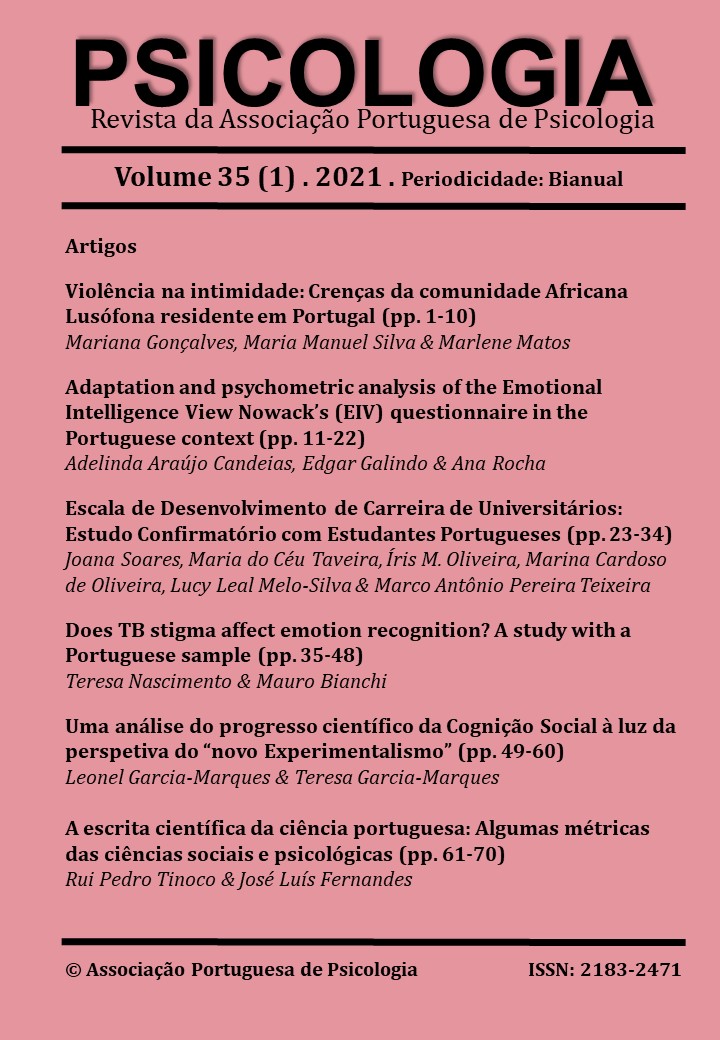Gender roles and dynamics in COVID-19 times: Changes and continuities in sharing arrangements of housework and caregiving
DOI:
https://doi.org/10.17575/psicologia.v35i1.1688Keywords:
Housework and caregiving sharing, justice, gender, COVID-19Abstract
This paper intends to understand the effects of the COVID-19 pandemic on shared unpaid work between men and women living as a couple during the confinement, to assess whether this situation influenced family dynamics, especially when professional status changed to teleworking. With this goal, weekly hours spent in housework and caregiving, perceptions of justice about sharing arrangements, and the impact of COVID in the housework and caregiving workload were analyzed, in a sample of 128 working-age participants, living as a couple, and mostly in telework (58%). The asymmetries identified in recent literature were also found in our study, particularly for couples with underage children. Women reported doing much more work than it would be fair, both in household and caregiving tasks. Parents reported a workload increase in caregiving tasks, compared to participants without children, independently of sex.
Downloads
References
Aboim, S., Wall, K., & Cunha, V. (2010). A vida familiar no masculino: negociando velhas e novas masculinidades. Género, família e mudança em Portugal. Comissão para a Igualdade no Trabalho e no Emprego (CITE). http://cite.gov.pt/asstscite/downloads/publics/A_vida_masculino.pdf
Alon, T. M., Doepke, M., Olmstead-Rumsey, J., & Tertilt, M. (2020). The impact of covid-19 on gender equality (NBER Working Paper No. 26947). National Bureau of Economic Research. http://www.nber.org/papers/w26947
Amâncio, L. (2007). Género e divisão do trabalho doméstico: o caso português em perspectiva. In K. Wall & Amâncio, L (Eds.) Família e género em Portugal e na Europa, (pp.181-209). ICS. -U.Lisboa https://repositorio.ul.pt/bitstream/10451/28234/1/ICs_KWall_LAmancio_Familia_LEN.pdf
Amâncio, L., & Correia, R. B. (2019). Em busca da igualdade: Perceção de justiça e divisão do trabalho doméstico-mudanças e continuidades. Sociologia, Problemas e Práticas, 90, 77-94. http://dx.doi.org/10.7458/SPP20199015529
Casaca, S. F. (2002, October). Questions and controversies revolving around telework - a gender perspective. Communicationpresented at the International Conference Work Time and Leisure Time – Dynamics and Convergence in Changing Context, "Questions and controversies revolving around telework – a gender perspective", ISEG, Lisbon.
EIGE (2019a). Gender Equality Index 2019: Portugal. https://eige.europa.eu/publications/gender-equality-index-2019-portugal
EIGE (2019b). Gender Equality Index 2019. Work-life balance. https://eige.europa.eu/publications/gender-equality-index-2019-work-life-balance
Eurostat (2020). Employment rates by sex, age and citizenship (%) [Bar Chart, Survey Data]. https://eige.europa.eu/gender-statistics/dgs/indicator/bpfa_f_offic_f11__lfsa_ergan/bar
Lyonette, C., Crompton, R., & Wall, K. (2007). Gender, occupational class and work-life conflict: A comparison of Britain and Portugal. Community, Work and Family, 10(3), 283-308. https://doi.org/10.1080/13668800701456245.
OECD (2020). Women at the core of the fight against COVID-19 crisis. https://www.oecd.org/coronavirus/policy-responses/women-at-the-core-of-the-fight-against-covid-9-crisis-553a8269/
Perista, H. (2002). Género e trabalho não pago: os tempos das mulheres e os tempos dos homens. Análise social, 37(163), 447-474.
Perista, H., Cardoso, A., Brázia, A., Abrantes, M., Perista, P., & Quintal, E. (2016). Os usos do tempo de homens e de mulheres em Portugal. Centro de Estudos para a Intervenção Social (CESIS)/Comissão para a Igualdade no Trabalho e no Emprego (CITE).
Rodrigues, L., Cunha, V., & Wall, K. (2015). Policy brief I—Homens, papéis masculinos e igualdade de género. Retrato Atual 2011/2014. ICS – Ulisboa/Comissão para a Igualdade no Trabalho e no Emprego (CITE). http://hdl.handle.net/10451/22495.
Rosenfeld, D. L., & Tomiyama, A. J. (2021). Can a pandemic make people more socially conservative? Longitudinal evidence from COVID-19. Journal of Applied Social Psychology. https://doi.org/10.1111/jasp.12745
Rosenfeld, D. L., Balcetis, E., Bastian, B., Berkman, E. T., Bosson, J. K., Brannon, T. N., Burrow, A. L., Cameron, C. D., Chen, S., Cook, J. E., Crandall, C. S., Davidai, S., Dhont, K., Eastwick, P. W., Gaither, S. E., Gangestad, S. W., Gilovich, T., Gray, K., Haines, E. L., . . . Tomiyama, A. J. (in press). Psychological science in the wake of COVID-19: Social, methodological, and meta-scientific considerations. Perspectives on Psychological Science. https://doi.org/10.31234/osf.io/6gjfm
Silva, P. A., Carmo, R. M., Cantante, F., Cruz, C., Estêvão, P., Manso, L., & Pereira, T. S. (2020). Trabalho e desigualdades no grande confinamento (Estudos CoLABOR, N.º 2/2020). CoLABOR. https://colabor.pt/en/publications/trabalho-desigualdades-grande-confinamento-rendimento-teletrabalho-en/
Wall, K., & Amâncio, L. (2007). Família e género em Portugal e na Europa. Imprensa de Ciências Sociais.
Wall, K., Cunha, V., Atalaia, S., Rodrigues, L., Correia, R., Correia, S. V., & Rosa, R. (2017). White paper: Men and gender equality in Portugal. ICS – Ulisboa/Comissão para a Igualdade no Trabalho e no Emprego (CITE). http://hdl.handle.net/10451/31936.


